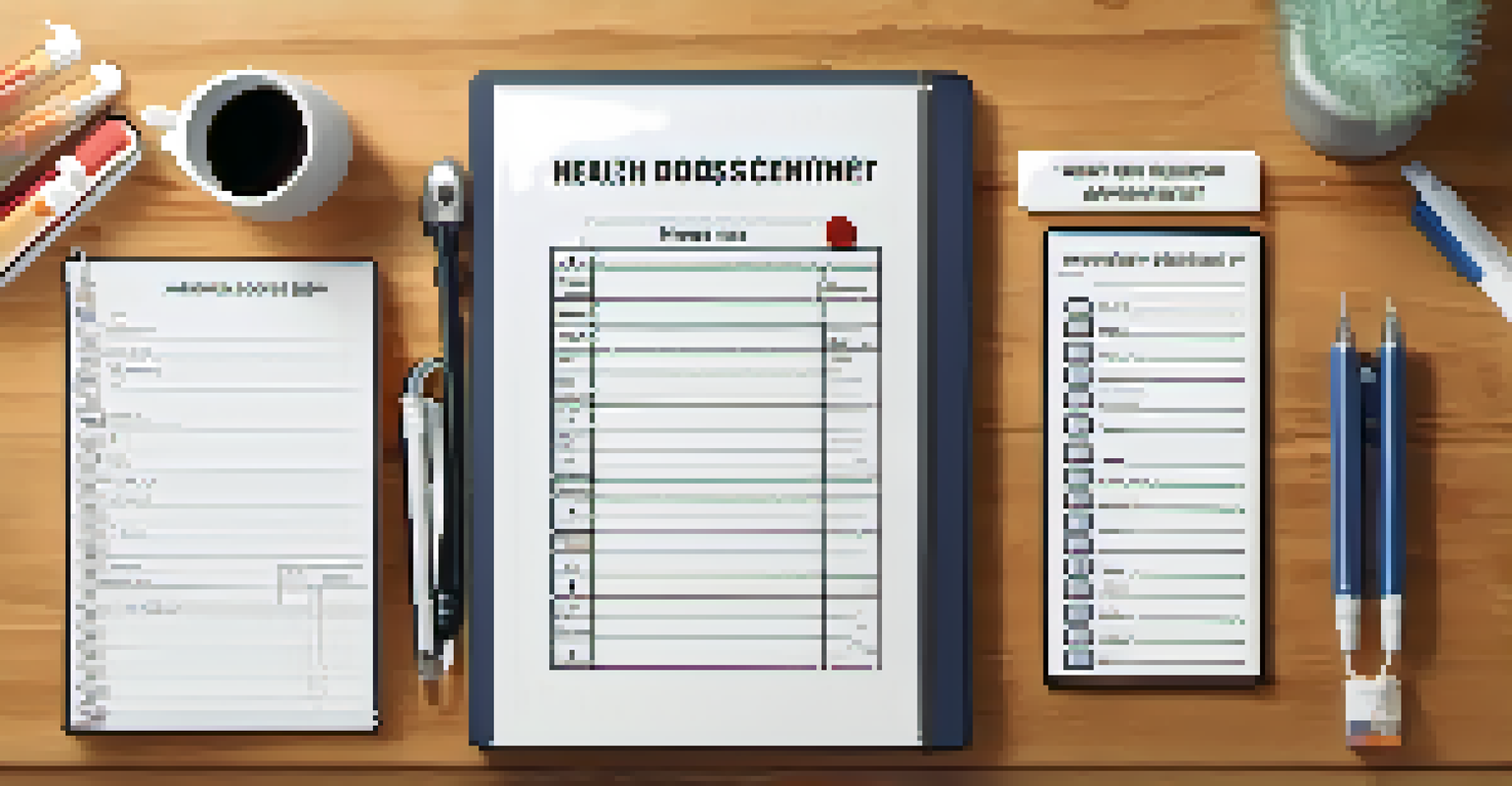How to Prepare for a Preventive Health Screening Appointment

Understanding What Preventive Health Screenings Are
Preventive health screenings are proactive measures taken to catch potential health issues before they become significant problems. These appointments can include tests for cholesterol levels, blood pressure readings, and cancer screenings, among others. By identifying risks early, you can take steps to maintain or improve your health.
An ounce of prevention is worth a pound of cure.
Think of these screenings as routine check-ups for your body, much like taking your car for regular maintenance. Just as you wouldn’t wait for your car to break down to get it serviced, it’s essential to schedule these appointments regularly to ensure your health is on track. Understanding the purpose behind these screenings can motivate you to prepare appropriately.
It's also important to note that the specific screenings recommended can vary based on factors such as age, gender, and family history. Therefore, consulting with your healthcare provider about which screenings are right for you is a great first step in your health journey.
Gathering Your Medical History for the Appointment
One of the most important things to do before your screening is to gather your medical history. This includes any previous surgeries, chronic illnesses, or medications you are currently taking. Having this information at your fingertips will help your healthcare provider understand your health better and tailor their recommendations to your needs.

You might find it helpful to create a list or even a document where you can record this information. Think of it as your personal health dossier—something that provides a comprehensive overview of your health journey. This preparation can save time during your appointment and ensure you don’t forget to mention anything crucial.
Importance of Preventive Screenings
Regular preventive health screenings help catch potential health issues early, enabling better management and improved health outcomes.
Additionally, if there are any significant health issues in your family, jot these down as well. Family medical history can play a critical role in assessing your risk for certain ailments, and sharing this information can lead to more personalized care.
Understanding the Tests You'll Undergo
Before your appointment, it’s a good idea to familiarize yourself with the tests that you might be undergoing. Each screening can involve different tests, such as blood tests, urine tests, or imaging studies. By knowing what to expect, you can mentally prepare yourself and reduce any anxiety about the unknown.
The greatest wealth is health.
For instance, if you’re scheduled for a blood test, understanding that it usually requires fasting for several hours can help you plan your day better. Think of it as gearing up for an adventure; knowing the route and what to expect can make the journey smoother. You can also discuss any concerns you have with your healthcare provider beforehand.
Additionally, you can usually find information on the specific tests online or through your healthcare provider’s office. This research can help you feel empowered and informed, turning the screening into a more manageable experience rather than a daunting one.
Preparing Mentally and Physically for the Appointment
It’s just as important to prepare mentally and physically for your screening as it is to gather information and understand the tests. Try to get a good night’s sleep before your appointment; feeling rested can help you stay calm and focused. Just like an athlete prepares for a game, you want to be in your best shape to tackle whatever comes your way.
Mindfulness techniques, such as deep breathing or visualization, can also be beneficial in reducing anxiety. Imagine walking into the appointment with confidence and leaving with a clearer picture of your health. This mental preparation can set a positive tone for the entire experience.
Prepare Your Medical History
Gathering your medical history ahead of time ensures your healthcare provider can offer personalized recommendations during your screening.
Physically, ensure that you follow any specific instructions given by your healthcare provider, such as fasting or avoiding certain medications. Following these guidelines can lead to more accurate results, which is ultimately what you want from your screening.
What to Bring to Your Preventive Health Screening
When the day of your screening arrives, it’s helpful to know what to bring along. Start with your insurance card and a form of ID, as these are often required for verification purposes. Additionally, bringing a list of medications you take, including dosages, can also streamline the process.
Consider bringing a notebook or a journal where you can jot down any questions or concerns you may have. This way, you won't forget to ask about anything important during your appointment. Think of it as packing for a trip; the more prepared you are, the smoother the journey will be.
Also, if you have any previous screening results or medical records, bringing them can provide your healthcare provider with valuable context. This information can help them make more informed recommendations tailored to your unique health profile.
Communication: Asking Questions and Sharing Concerns
Effective communication with your healthcare provider is key during your screening. Don’t hesitate to ask questions about the tests, the procedures involved, or any concerns you may have regarding your health. Remember, this is your health journey, and being engaged makes a significant difference.
Sharing any symptoms you’ve experienced, no matter how minor they may seem, can provide your provider with a more comprehensive view of your health. Think of it like sharing clues in a mystery; every piece of information helps them solve the puzzle of your well-being.
Communicate Openly with Providers
Effective communication with your healthcare provider about concerns and symptoms is crucial for a comprehensive understanding of your health.
Lastly, if you have concerns about potential outcomes or what the next steps might be, discussing these openly can help alleviate anxiety and provide clarity. Your provider is there to partner with you in your health journey, so keep the lines of communication open.
Follow-Up: Understanding Next Steps After the Screening
After your screening, it’s important to know what the next steps are. Your healthcare provider will typically discuss the results with you, and if any follow-up tests or appointments are necessary, they will guide you on how to proceed. Understanding these next steps is crucial for maintaining your health.
Sometimes, you might need to wait a few days for results, and this can be a time of anxiety for many. To ease this, consider scheduling a follow-up appointment in advance, so you know exactly when you’ll get the results. It’s like having a ticket to a show; knowing when to expect it can make the wait more bearable.

Lastly, whether the results are positive or require further investigation, staying proactive about your health is essential. Continue to maintain regular check-ups and screenings as recommended, and keep an open dialogue with your provider about any changes in your health.